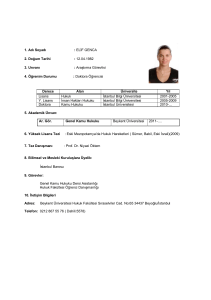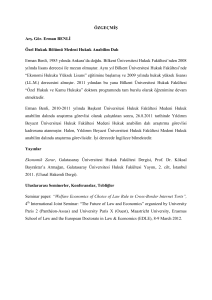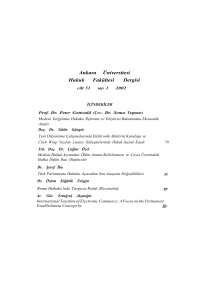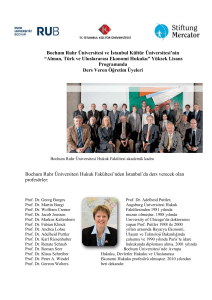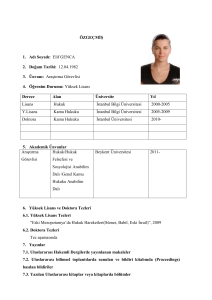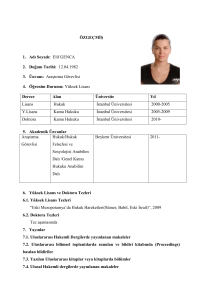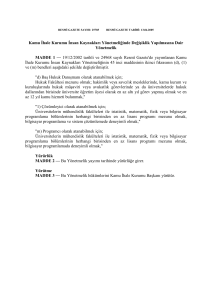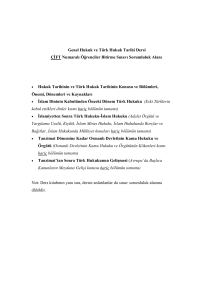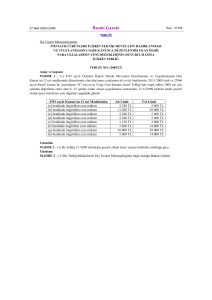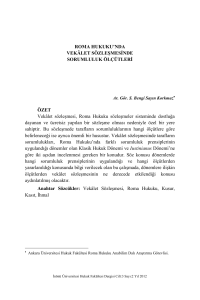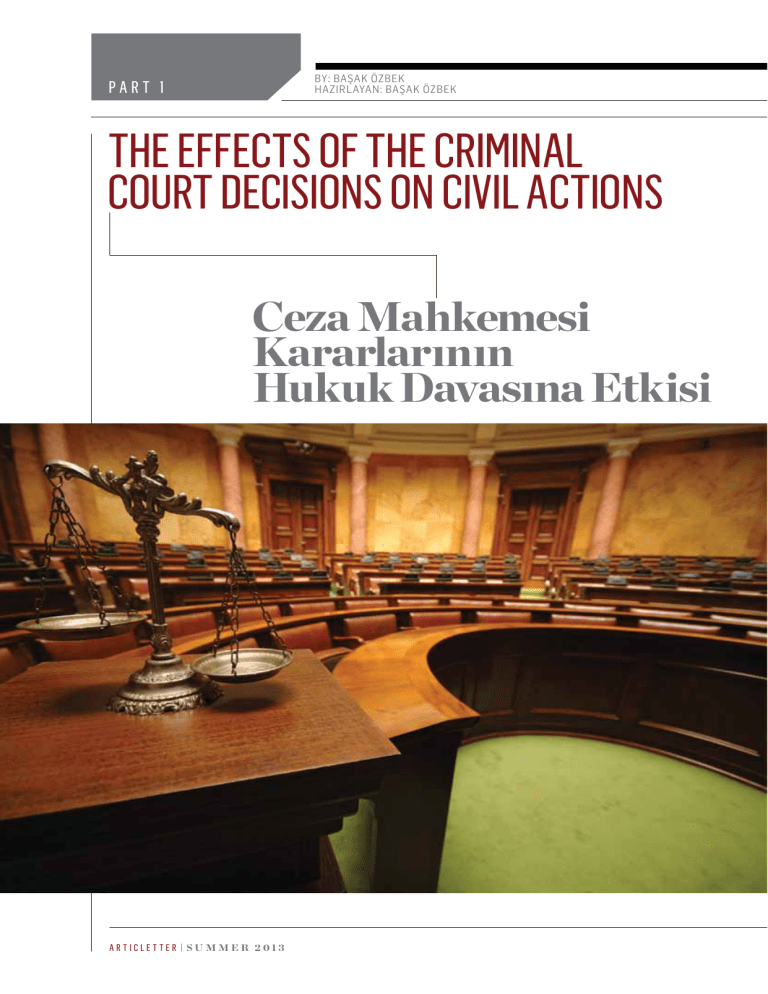
BY: BAŞAK ÖZBEK
HAZIRLAYAN: BAŞAK ÖZBEK
PART 1
THE EFFECTS OF THE CRIMINAL
COURT DECISIONS ON CIVIL ACTIONS
Ceza Mahkemesi
Kararlarının
Hukuk Davasına Etkisi
ARTICLETTER | SUMMER 2013
N CASE WHERE A TORT ALSO CONSTITUTES A CRIME IT IS LIKELY
to face both criminal cases and civil actions. In that case,
while proceeding an action for damages, whether the
judge is bound with the principles of criminal law, especially with the judgments of acquittal or of conviction of
criminal becomes more of an issue. The subject of this article is whether the decisions of the criminal courts have any
effect on the civil court judgments.
Turkish Code of Obligations (“TCC”) stipulates the independence of the judiciary in Article 74 as follows;
“Judge, while deciding whether the wrongdoer is faulty or
have capacity to act, is not bound with the acquittal of the
criminal court judge as well as being not bound with the provisions of criminal law as to the responsibility.
Along the same line, the decisions of the criminal court judge
on the evaluation of the fault and the determination of the
damage has no binding effect on the civil court judges.”
In order to evaluate the article in detail, the relationship between the criminal law and the civil law should be analyzed.
As a principle, the decisions of criminal courts do not affect
the civil court decisions, and vice versa, by the reason of the
difference between their subjects, purposes, rules of evidence, analyze and judgment methods. However, in some
cases, the decisions of criminal and civil courts may affect
each other.
As seen in the above mentioned provision, civil court judge,
above all, is not bound with the criminal law principles as to
the imputability or with the acquittal judgments of criminal court, in order to decide on a case. However, the person
who sentenced by a criminal court by being faulty cannot be
fully accepted as innocent by the civil court. The situation
does not differ in terms of the determination of the damage.
The judge of the civil court must determine whether the
torturer has capacity to act or is faulty in accordance with
the principles of “civil law”. In that case, if the torturer has
been found faulty and had capacity to act under Civil Code
provisions, the judge decides on the amount of compensation accordingly.
Although it is understood from the wording of the provision that the civil court judge is not bound with the decision of the criminal court as to the fault, capacity to act and
the acquittal, the provision should be interpreted as to its
purpose. In that context, the civil court judge evaluates all
the elements of the tort independently and decides as to
the concrete case regardless of any decision as to acquittal
or the conviction. By this reason, the civil court judge is independent while deciding on a case.
İR HAKSIZ FİİLİN AYNI ZAMANDA SUÇ TEŞKİL ETMESİ HALİN-
de, hem ceza hem de hukuk yargılaması söz konusu
olabilir. Bu takdirde, hukuk hâkimi tazminat davasını görürken, ceza hukuku kurallarıyla ve özellikle
ceza mahkemesinin vermiş olduğu beraat ve mahkûmiyet
kararıyla bağlı olup olmadığı önem arz eder. Bu makalenin
konusu da, ceza hukuku kurallarının ve ceza mahkemesi
kararının hukuk mahkemesi kararlarına etkisi olup olmadığıdır.
Türk Borçlar Kanunu (“TBK”) hukuk hâkiminin bağımsızlığını madde 74’de şu şekilde düzenlemiştir;
“Hâkim, zarar verenin kusurunun olup olmadığı, ayırt etme
gücünün bulunup bulunmadığı hakkında karar verirken,
ceza hukukunun sorumlulukla ilgili hükümleriyle bağlı olmadığı gibi, ceza hâkimi tarafından verilen beraat kararıyla da bağlı değildir.
Aynı şekilde, ceza hâkiminin kusurun değerlendirilmesine
ve zararın belirlenmesine ilişkin kararı da, hukuk hâkimini
bağlamaz.”
Maddeyi yakından incelemek gerekirse; ilk olarak ceza
hukuku ile medeni hukuk arasındaki ilişki incelenmelidir.
Kural olarak, ceza ve hukuk mahkemesi kararları karşılıklı
olarak birbirini etkilemez. Çünkü, hukuk ve ceza davalarının yapısı, konuları, amaçları, kanıtları, değerlendirme
ve yargılama yöntemleri birbirinden farklıdır. Ancak, bazı
durumlarda ceza ve hukuk mahkemesi kararları birbirini
etkileyebilirler.
Hükümden de anlaşıldığı üzere; her şeyden önce hukuk
hâkimi kusurun varlığı, derecesi yönünden ve failin ayırt
etme gücü olup olmadığına karar verebilmek için, ceza
hukukunun isnat kabiliyetine ilişkin hükümleri ile bağlı
olmadığı gibi, ceza mahkemesi tarafından verilen beraat kararıyla da bağlı değildir. Ancak, ceza mahkemesinde
kusurlu kabul edilerek mahkûm edilen bir kimse, hukuk
mahkemesinde tamamen kusursuz kabul edilemez. Durum, zararın miktarının tayini yönünden de aynıdır.
Hukuk mahkemesi hâkimi, failin temyiz kudretine sahip
olup olmadığını, kusuru bulunup bulunmadığını “Medeni
Hukuk” esaslarına göre tayin etmelidir. Bu durumda Medeni Kanun hükümlerine göre kusur varsa ve temyiz kudretine sahip olduğu tespit edilirse, buna uygun tazminata
hükmedecektir.
Her ne kadar maddenin lafzından çıkan anlama göre; hukuk hâkimi kusur, temyiz kudreti tayini ve beraat kararıyla bağlı olmadığı anlaşılıyorsa da, maddeyi kanunun amacına göre yorumlamak gerekir. Buna göre, hukuk hâkimi
haksız fiilin tüm unsurlarını bağımsız olarak inceler ve
GSI | 7
PART 1
It is certain that the civil court judge is independent to determine the fault as stated in the above mentioned article.
Besides that, although the elements of act, causality and illegality are not expressly included in Article 74, this article
does not limit the scope, gives those only as an example. By
this reason, it may be said that civil court judge is granted
full independency. As an example, imputability of criminal law and capacity to act which is a requirement of being
legally responsible differ from each other. As per Turkish
Criminal Code, the one who is under the age of 12 does not
have criminal capacity. Yet, civil court judge, as to the concrete case and if the requirements of tort have been met,
may render damages against someone under the age of 12.
In that case, the judge determines the capacity to act and
degree of fault in accordance with civil law.
Besides, incrimination of mentally challenged persons is
not possible as per criminal law, as a principle, the judgment as to the identification of the perpetrator binds the
civil court judge.
The outcome of the proceeding may differ because of the
difference between concepts of those two law branches.
The underlying reason is that, civil law adopted the objective theory of fault while subjective theory of fault is adopted by criminal law. By this reason, degree of fault in terms of
civil law is stricter than of criminal law.
Although civil law judge is independent on evaluation of the
concrete case, the criminal court decision on the identification of the perpetrator, as principle, binds the civil court.
It is stated in Article 74 of the TCC that the acquittal judgments rendered by the criminal court by the reason why
the tort also constitutes a crime do not bind the civil court
judges during an action for damages. Because, even if the
act does not constitute a crime, it may against the law in
terms of civil law and causality is interpreted differently in
criminal law compared to its interpretation in civil law.
Nevertheless, although it is controversial and discussed
among the jurists, it cannot be accepted that the acquittal
judgment rendered on grounds of that the act cannot
attributed to the accused has no binding effect on the
civil court judge. According to a highly accepted view, the
acquittal judgment based on “the lack of evidence” does
not bind the civil law judge. However, according to another
view, if the acquittal judgment ascertains a substantive fact,
such a judgment binds the civil law judge as well.
In cases where the civil law judge is not bound with the
acquittal decision, the judge should justify his decision by
specifying its grounds to decide on the contrary of the sentence.
ARTICLETTER | SUMMER 2013
beraat ya da mahkûmiyet kararı fark etmeksizin somut
olaya göre kararını verir. Bu nedenle, hukuk hâkiminin
bağımsızlığından bahsedebiliriz.
Maddede de belirtildiği üzere kusurun belirlenmesi konusunda hukuk hâkiminin bağımsız olduğu kesindir. Bunun yanı sıra, fiil, illiyet bağı ve hukuka aykırılık unsurları
her ne kadar madde 74’de belirtilmemişse de, sözü geçen
madde deki sayım tüketici olmayıp sadece örnek niteliğindedir. Bu nedenle, tam bir bağımsızlık tanınmıştır
hukuk hakimine. Bir örnek vermek gerekirse; ceza hukukunda isnat kabiliyeti ile hukuki sorumluluğu gerektiren
ayırt etme gücü birbirinden farklı kavramlardır. Türk
Ceza Kanun’una göre 12 yaşından küçüklerin ceza ehliyeti yoktur. Fakat hukuk mahkemesi hâkimi somut olaya
göre, haksız fiilin şatları oluştu ise, 12 yaşında küçük kimseye dahi tazminata hükmedebilir. Bu durumda hâkim,
medeni hukuka göre temyiz kudretini ve kusur oranını
belirlemektedir.
Keza, ceza hukukuna göre; akıl hastalarına ceza verilemezken haksız fiile ilişkin hukuk davasında hakkaniyet
gereği tazminata hükmedilebilmektedir. Bu iki hukuk dalında kavramların farklı anlamları taşıması sebebi ile yargılama sonucu doğacak sonuç değişebilmektedir. Bunun
en temel sebebi ise; medeni hukukta objektif kusur teorisinin kabul edilmiş, ceza hukukunda ise sübjektif hukuk
teorisinin kabul edilmiş olmasıdır. Bu yönden medeni hukuktaki kusur ölçüsü ceza hukukuna oranla daha katıdır.
Her ne kadar somut olayı değerlendirmede hukuk hakimi bağımsız olsa da failin kimliğinin tespitine ilişkin ceza
mahkemesi kararı ilke olarak hukuk hakimini bağlar.
Bir haksız fiilin aynı zamanda suç teşkil etmesi sebebi ile ceza mahkemesi tarafından verilen beraat kararı, tazminat davasında hukuk hâkimini bağlamayacağı
BK m.74 ile ifade edilmiştir. Zira, fiil suç teşkil etmese de
medeni hukuk açısından hukuka aykırı olabilir ve illiyet
bağı ceza hukukunda medeni hukuktan farklı yorumlanmaktadır.
Ancak, sanığa isnat edilen fiili işlemediği gerekçesi ile
ceza mahkemesinde verilen beraat kararı hukuk hâkimini
bağlamaması kabul edilemez. Bu durum doktrinde de
tartışılmaktadır. Oğuzman ve Fikret Eren’in savunduğu
ve baskın olan görüşe göre; “delil yetersizliğine” dayanan
beraat kararı hukuk hâkimini bağlamaz. Ancak Turgut
Uygur’a göre, beraat kararı maddi bir olguyu tespit ediyorsa, bu karar hukuk hâkimi için de bağlayıcıdır.
Hukuk hâkimi beraat kararı ile bağlı olmadığı hallerde,
ceza ilamından farklı bir sonuca varma sebeplerini gerekçeli olarak kararında izah etmelidir.


